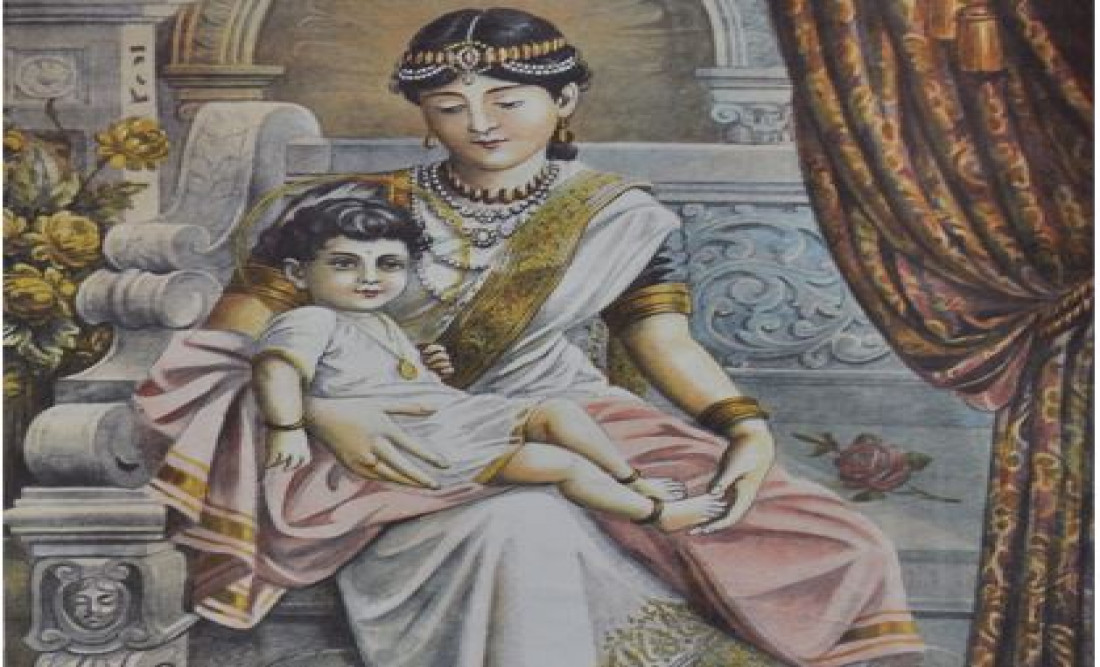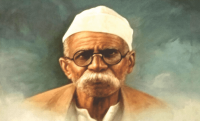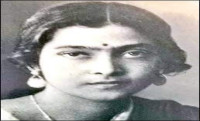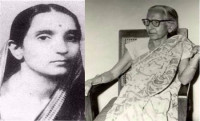Mahaprajapati Gautami - Life History
By Manoj Bhiva | Posted on 17th Jan 2022 |
Biography

Mahaprajapati Gautami
Mahaprajapati Gautami is of great importance in Buddhist history.
Siddhartha - After the death of Mother Mahamaya, if Mahaprajapati
Gautami had not brought up Siddhartha, then perhaps we would have been
deprived of the world's best Ratan Buddha Dhamma, Sangha. We are
presenting here only a brief biography of such a great woman.
About
two and a half thousand years ago, in the foothills of the Himalayas,
the capital of the Koli dynasty kings was located in a city called
Devdah. The kingdom of the Kolis was adjacent to Kapilvastu, the
kingdom of the Shakyas. The river Rohini used to flow between these two
states. There were two beautiful daughters of the successful king
Mahasubudha - Mahamaya and Prajapati. In the first phase of the puberty
of these living idols of form and quality, the auspicious result
(marriage) took place with Suddhodana, the king of Kapilvastu. Due to
growing up, Mahamaya became the chief princess and Prajapati II. She
was also called as "Mahaprajapati Gautami".
Shuddhodan
was a very brave, mighty warrior and just king. By the way, he was
married to 'Mahamaya'. When Shuddhodana defeated the Pandava caste
settled in the mountainous area with his valor in the war, he was
allowed to have another marriage. He chose Mahamaya's sister Prajapati.
On
the auspicious occasion of Vaishakh Purnima, on the auspicious occasion
of Vaishakh Purnima, a child Siddhartha was born on the holy land of
the Terai of Nepal from Mahishi Mahamaya. The virtuous agar Mahishi
Mahamaya left her mortal body on the seventh day after the birth of the
child.
Maharaja
Shuddhodana was worried about the upbringing of a child with
extraordinary qualities, because the child for whom astrologers,
oceanographers and great sages had predicted to become the Chakravarti
king or the savior of all beings, had to be handed over to the right
hands. Goddess Mahaprajapati had great reverence and affection for her
elder sister. After the parinirvana of Mahamaya Devi, Mahaprajapati
became the chief princess. On those days a son named Nand was also born
to him. But the loving mother, Gautami, entrusted her infant in the
hands of a bodhisattva and considered herself blessed by taking the
burden of taking care of the infant. Due to the great devotion he had
for his elder sister, he brought up the infant Siddhartha with peace and
love. In his loving motherly love, Kumar Siddhartha practiced Vidya
with many qualities like kindness, charity, efficiency etc. Goddess
Gautami's heart swelled with joy after getting Yashodhara-si bride.
The
heart of the mother, who was enthusiastic in all the works of son
Siddhartha, was pained by the abandonment of Kumar. Forgetting her
sorrow from the misery of the renunciation Yashodhara, she started
spending the days of her life. Siddhartha did severe penance for many
years. After defeating and conquering the Dhammachakra, when Lord
Buddha came to Kapilvastu, satisfying the living beings with nectar,
then the newly married wife of the only son of Goddess Gautami, and
relinquishing the throne, took refuge in the Triratna. The grandson of
Maharaja Shuddhodana and the only son of Yashodhara, Rahul also took
Pravajya. Goddess Mahaprajapati was also very impressed after hearing
his welfare teachings. She expressed the desire to sacrifice everything
to walk on the path of human welfare, but Lord Buddha did not allow
confused women to come on the path of renunciation. Yet she did not
despair and impressed five hundred women with this auspicious thought.
Once
upon a time, Lord Vaishali was doing good to the living beings by
showering nectar in the form of a sermon in the garden. Then Goddess
Gautami, with enthusiasm and seriousness in her heart, traveled on foot
from Kapilvastu to Vaishali with five hundred Shakya-Sukumaris. The
bodies of Sukumaris were withered. His feet were swollen and swollen,
but he had a high determination in his soft mind, to establish the
Bhikkhuni-Sangha. Ananda, the beloved disciple of the Lord, noticed
this and asked the Mahakarunik Lord - "Bhante! Is there no talk of
welfare of women in your sacred religion? ,
God
told for everyone in his auspicious speech. On the persuasion of
Bhante Anand, he gave the auspicious approval of women to be
bhikkhunis. It was a glorious golden day for women, when the first
Bhikkhuni-Sangh was established by the hard efforts of Goddess Prajapati
Gautami, the leader of equal rights. Five hundred Shakya Sukumaris
took Kashaya clothes (Chevar). Goddess Gautami became his chief. These
sages pleased the Lord with their spiritual practice and they also got
the same rights as the Upasampada and the bhikkhus.
That
was the last birth of the Goddess born after doing spiritual practice
for many births (stages); One who had followed a divine son like
Siddhartha. He attained the position of Arhat through concentrated
contemplation and supernatural meditation by the teachings of the Lord.
When the Lord was residing in Mahavan near Vaishali's Kutagarshala, she
was also there along with the Bhikkhuni-Sangha.
One
day after taking care, he thought, how will his loving tender heart
tolerate the Mahaparinirvana of God, the parinirvana of Kumar Nand and
Rahul? Therefore he himself should renounce the body before everyone
else. For this he pleaded with God. The Lord gave him sermons in a
calm and serious voice, so that he attained the benefit of the supreme
peaceful parinirvana by being in samadhi.
Goddess
Gautami had an unwavering faith in the Lord. She considered him as a
great hero of world welfare. Even today in the Therigatha, the udanas
(exclamations that come out of the heart of Harshad), full of his
unparalleled devotion, are present. With so much emotion and
succinctness he has said -
- Buddha Veera Namo Tyatthu, Sabbasattanamuttam. Yo me dukkha pamochesi, anancha bahukanjanam.
Meaning - Oh Buddha! O hero! O best creature! hello to you Who has freed me and many other beings from suffering.
- Sabbadukkhan parinnaatan , hetutanha visosita . bhaavito atthagiko maggo , nirodho paphusito maya
Meaning
- All my sorrows are gone. I came to know how sorrows arise. Now I
have dried up the craving for their root cause (cause). Today, I have
touched the path of suffering-control-gami, Arya-Attangaik path, I have
walked in it.
- maata putto pita bhaata , a yaka ch pure ahun . yathaabhuchchamajaanantee , sansarihan anibbisan
Meaning - Many times in previous lives, I have become mother, son, father, brother, mother-in-law, I wandered in the world without knowing the things in their true form, and I never found that thing which I wanted.
- Diṭṭhō hi mē sō bhagavā, antimōyaṁ samus'sayō. Vikkhīṇō jātisansārō, nat'thi dāni punabbhavō
Meaning-
(Now in this birth) I saw that Lord Buddha (I felt) this is my last
body. My movement has stopped, now I do not have to take birth again.
- Ārad'dhavīriyē pahitattē, niccaṁ da haparakkamē. > Samaggē sāvakē pas'sē, ēsā bud'dhāna vandanā
Meaning - Absorbed in effort, Atta-sammy (self-restrained), constantly determined with valor, observe these integrated (unified) Shravakas (Buddha disciples) - this is the veneration of Buddhas.
Meaning - oh! For the welfare of many (Maha) Maya gave birth to Siddhartha Gautama, who cut off the sorrows of beings suffering from disease and death.
Prajapati
says, "Sugat! I am your mother but, you are my father. Because he
followed the teachings of Tathagata. Lord Buddha, like a father, gave
him innovative peace with wisdom and unparalleled teachings. Elsewhere
she says -
"Ah!
For the sake of Bahujan Hitaya, Mahamaya gave birth to Gautam, he freed
all beings from the woes of disease and death. Today I walk on the
Arya-Eightal path leading to the cessation of suffering.
I
worship you Buddha, you are the best. You have given the boon of peace
to so many women like me by saving them from the flame of sorrow. This
is my last birth. I no longer crave for your knowledge. You have
taken away the misery of the living beings."
How
much reverence was there, how much devotion was there in the welfare
teachings of those great people. Blessed are those women and gems whose
goal was to do good to all the creatures of the world and to liberate
life by attaining knowledge. She was the great heroine of the women's
world, who brought women equal to men and did the welfare of the women
world by getting the nectar element.

Manoj Bhiva
Manoj Bhiva is a dedicated writer who loves to write on any subject. Manoj Bhiva maintains a similar hold on politics, entertainment, health, abroad articles. Manoj Bhiva has total experience of 3 years in web and Social. Manoj Bhiva works as a writer in Wordict Post.Trending
World

Congresswoman Alma Adams from North Carolina is found to have COVID-19
Posted on 15th Aug 2022

Russian Rocket 'Totally Destroys' Dorm, Unknown Amount Dead: Zelensky
Posted on 18th Aug 2022

A 4.4 magnitude earthquake that struck Northern California only caused minor damage.
Posted on 14th Sep 2022







